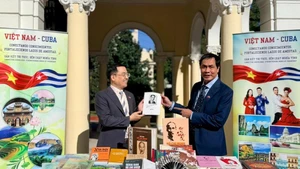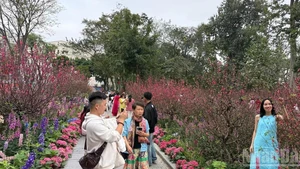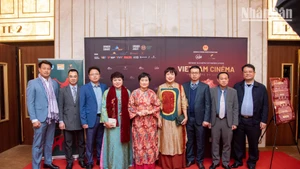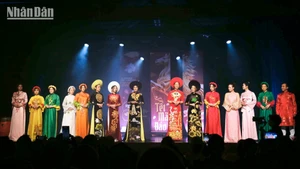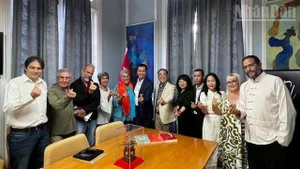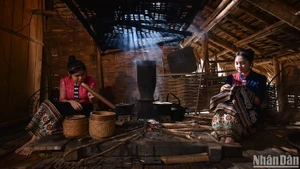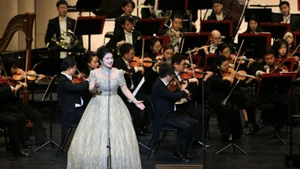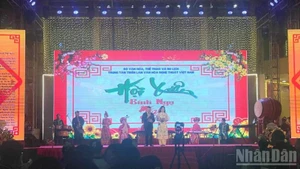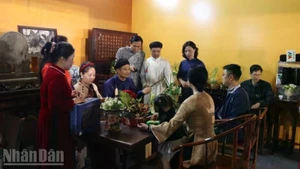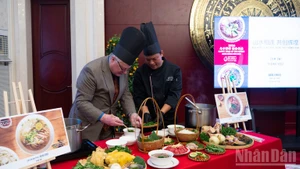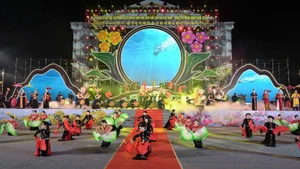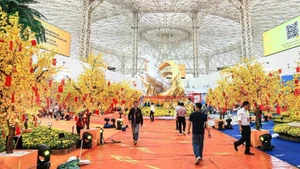This achievement further affirms Viet Nam’s cultural identity and brand on the global stage.
Traditional values nurturing success
On the evening of September 20 in Moscow, singer Duc Phuc made history when he surpassed contestants from 22 countries to be crowned champion of the Intervision 2025 International Music Contest with an emphatic lead. The top three scores were: Viet Nam 422 points, Kyrgyzstan 373 points, and Qatar 369 points.
His performance featured the song “Phu Dong Thien Vuong”, inspired by the poem “Tre Viet Nam” (Vietnamese Bamboo) - a work imbued with strong national identity. Sharing about his entry, Duc Phuc said he and his team had prepared thoroughly, from music to staging, fusing epic elements with modern music to convey resilience, unity, and the national aspiration for advancement. Notably, the performance included a rap segment in three languages – Vietnamese, English and Russian – carrying the message: “Today we make history together.”
The performance electrified the atmosphere of the final night, earning continuous applause. According to experts, this is the greatest victory of a Vietnamese singer since 1981, when artist Ai Van won a major prize at the Sopot International Song Festival in Poland – marking a new milestone in Vietnamese music’s journey to the world. Many were moved to tears watching the red flag with a yellow star wave on the giant LED screen as Vietnam’s name was repeatedly announced during the award ceremony.
According to the Department of International Cooperation under the Ministry of Culture, Sports and Tourism, Duc Phuc’s victory is not only a historic moment for contemporary Vietnamese music but also a brilliant achievement in Viet Nam’s cultural diplomacy. It highlights the talent of Vietnamese artists while demonstrating the effectiveness of international cooperation, bringing Vietnamese music and cultural identity closer to global audiences and contributing to the internationalisation of Vietnamese culture.
Duc Phuc’s success is not an isolated case but a telling example of a cultural phenomenon spreading widely: young Vietnamese artists are increasingly aware of the value of tradition, finding innovative and creative ways to integrate traditional and modern elements to create distinctive works that resonate with international audiences.
In July 2025, at Sing! Asia 2025 in China, singer Phuong My Chi reached the top three with performances rich in folk character. Her performances won high praise from judges for showcasing the “vitality of Asian culture”.
Similarly, in May 2025, singer Tung Duong became the first Vietnamese artist honoured at the Music Awards Japan (MAJ) 2025, winning the the Dedication Music Awards. His performance was acclaimed for transforming various forms of folk art into contemporary compositions, reaffirming Vietnamese music’s distinctiveness and potential on the world music map.
Earlier, in 2019, singer Hoang Thuy Linh won “Best Vietnamese Artist in Asia” at the Mnet Asian Music Awards (MAMA) in the Republic of Korea. With folk-inspired music products, Hoang Thuy Linh has been active in connecting and promoting Vietnamese culture to international friends.
A promising direction
The success of many young artists in creatively harnessing Viet Nam’s cultural identity to win over global audiences reflects a positive shift in artistic perspectives and practices. This demonstrates that traditional values are neither rigid nor closed-off from modern life, but rather a rich source of inspiration and valuable material for creativity, offering a competitive advantage in the context of globalisation.
Dr Lu Thi Thanh Le, lecturer at the Faculty of Interdisciplinary Sciences and Arts, Viet Nam National University, Ha Noi, commended young artists for discovering within Viet Nam’s cultural heritage a rich resource from which to create new works that serve contemporary life while retaining national identity. This both contributes to preservation and introduces Vietnamese culture to broader audiences, while producing new high-quality products to attract the public.
It is also important to recognise that alongside individual elements such as talent, passion and artistic investment, the environment, policies and institutional support from cultural and media agencies play a crucial role. For example, Duc Phuc’s Intervision 2025 triumph, besides his and his team’s efforts, also benefited greatly from the professional guidance and facilitation of the Ministry of Culture, Sports and Tourism and the Vietnamese Embassy, ensuring Viet Nam’s performance was well-produced and promoted.
Deputy Minister of Culture, Sports and Tourism Ta Quang Dong stated: “Duc Phuc’s victory is a shared pride of Vietnamese music. This is not only a personal achievement but also reflects the Ministry’s serious and methodical preparation in selecting, training and supporting young musical talents to reach the international stage. The Ministry will continue to provide opportunities for more Vietnamese artists to shine on major world stages.”
The achievements of Vietnamese artists on the international music scene in recent years demonstrate that national cultural identity is a solid foundation enabling artists to leave a mark and shine. This is also an effective means of promoting Viet Nam’s image and people to the world.
The achievements of Vietnamese artists on the international music scene in recent years demonstrate that national cultural identity is a solid foundation enabling artists to leave a mark and shine. This is also an effective means of promoting Viet Nam’s image and people to the world. These victories, therefore, transcend personal success to become the pride of the entire community, stirring patriotism and appreciation for the values passed down by previous generations.
To further extend the reach of Vietnamese identity, music should be accompanied by similar efforts in other art forms such as cinema, theatre, photography and literature. Viet Nam faces great prospects and opportunities to develop its cultural industries, especially in the digital era, where online platforms offer significant advantages in bringing art to global audiences.
Associate Professor Dr Nguyen Thi Thu Phuong, Director of the Viet Nam National Institute of Culture and Arts Studies, emphasised that Viet Nam needs to transform its cultural soft power into attractive channels of international exchange, thereby leveraging advantages to develop cultural industries.
Nevertheless, challenges remain. Fierce competition in the context of global integration requires Vietnamese music and culture more broadly to innovate while preserving identity, avoiding risks of dilution or distortion from external trends.
According to a UNESCO report, 70% of folk art forms are in decline due to globalisation. Therefore, awareness of preserving traditional values must be strengthened both in creative activities and in community consciousness. With the right policies of the Party and State, a national strategy for cultural development in the new era, the efforts of artists, and the support of the public, we can fully expect more musical products and other art forms to continue to shine, affirming Viet Nam’s cultural brand and identity on the international stage.


